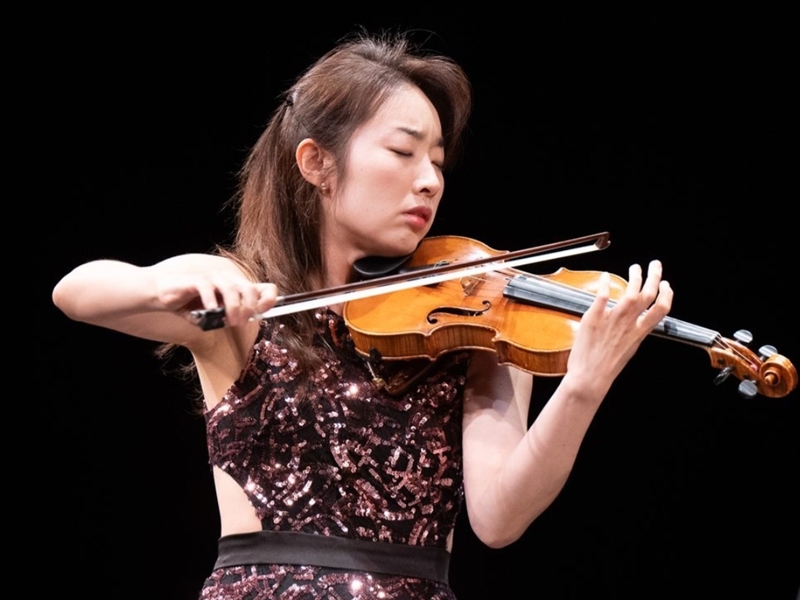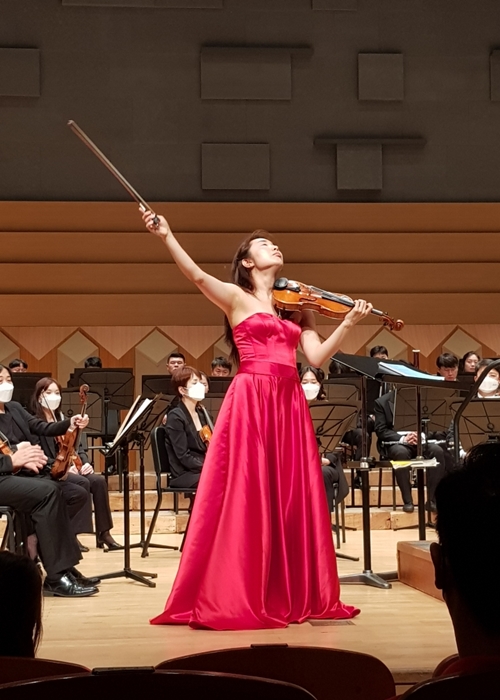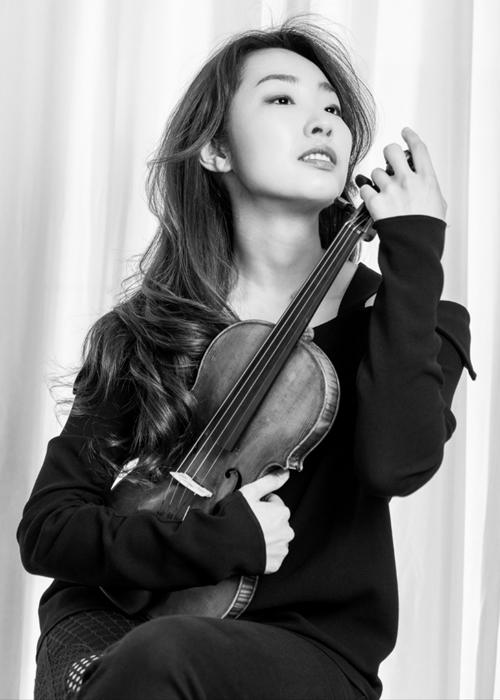
Violinist Kim Yoon Hee on Aug. 3 performs at Benaroya Hall in Seattle commemorating the 70th anniversary of Korea's bilateral alliance with the U.S.
By Lee Dasom of Korea.net and Kang Sung-chul of Yonhap News
Photos = Kim Yoon Hee
"Meeting the violin was destiny. Music and the violin are my passion and love."
Violin virtuoso Kim Yoon Hee, who was born on Jeju Island, showed extraordinary talent when she first started playing the instrument at age 3. A year later, she achieved the miracle of becoming the youngest student admitted to a preparatory program of the University of Music and Performing Arts Vienna (Austria).
She kept setting records as the youngest to collaborate with the Savaria Symphony Orchestra of Hungary at age 5, Trondheim Symphony Orchestra & Opera of Norway at 13, Spanish Radio and Television Symphony Orchestra at 14, Stuttgart Philharmonic Orchestra of Germany at 15, Monte-Carlo Philharmonic Orchestra of Monaco at 16, and Spanish National Orchestra and KBS Symphony Orchestra at 17.
As the youngest graduate of the Vienna university at age 19, Kim was called a violin "prodigy" by CNN of the U.S. and one of the "30 mysteries of the world" by TF1 of France.
A resident of Austria who performs in Europe, the U.S. and Korea, the virtuoso consistently practiced the violin for 10 hours daily until her 20s. Even today, she puts in seven to eight hours each day in her craft and does physical exercise during her remaining time.
Kim on Nov. 8 gave a joint interview to Korea.net and Yonhap News while visiting Korea last month to play with the Jeonju Symphony Orchestra based in Jeonju, Jeollabuk-do Province.
How did you begin playing the violin?
The first instrument I learned was the piano. Because of my active personality, sitting in front of the piano and tapping the keys felt boring. And then at age 3, I was introduced to the violin through my mother's acquaintance.
Playing the violin seemed cooler and was more fun to learn since it's played standing up, so I switched to the violin. My mother was also a big influence because she showed me orchestral performances from an early age. I remember from childhood that the violin part sounded good. That caught my attention as a three-year-old.
You were the youngest to enter a preparatory program of the University of Music and Performing Arts Vienna.
I settled in Austria through pure chance. About a year after learning the violin, I went on a short visit to my maternal aunt, who was living in Vienna. She mentioned a renowned tutor there who taught gifted students well and recommended that I get private lessons from him.
I heard that it would be a skills test and played without much thought. As soon as I finished, however, the tutor told my aunt that he wanted me as his pupil. He said my performance wasn't outstanding but felt "This is the child." So I met my first violin tutor while visiting Vienna and I've lived there since.
Did your title of "youngest ever" in every music collaboration pressure you?
It didn't pressure me because I didn't think being the youngest ever was that important. Of course, a child performing on a big stage is great but the title was merely to introduce myself to the audience. What's most crucial is performing well. My only concern was how to play better.
Is collaboration between an orchestra and a soloist hard?
I had my first collaborative performance at age 5. It's not easy for a five-year old to perform with an orchestra. But I think that was my first taste of a stage. I love the process of endless practice before going up on stage and presentation of a finished performance.
I'm certain that I can play well by feeling not only bright and positive emotions but also overcoming the pain and difficulty through practice. I can enjoy this entire process with an enjoyment attitude because I love the stage so much.

Kim Yoon Hee on June 17 plays Mozart's Violin Concerto No. 3 at her collaborative concert with the Chungbuk Philharmonic Orchestra at Cheongju Art Hall in Cheongju, Chungcheongbuk-do Province.
Which overseas performance do you remember most from the many you have had?
Each performance is meaningful so selecting just one is hard. I had a recital at Carnegie Hall in New York when I was 23. At the time, I thought a lot not just about music but everything else. But I had to play, so I grit my teeth and prepared.
On the day of the performance, I suddenly felt how precious the stage was and felt a strong energy. I felt that all my struggles were alleviated after getting a standing ovation. For the first time, I cried after a performance. I then learned why it's important for musicians to feel a range of emotions and how that positively affects music. I matured a lot thanks to that.
You have played the violin for 30 years from age 3. How do you avoid burnout?
Music is my life's top priority and my goal is to perform well for a long time. That's how passionate I am about and love music and the violin. But my energy for both cannot be the same every day.
When I lose energy, I do physical exercise to motivate myself again. I especially recharge my passion and energy through dynamic exercise. Hobbies are vital for musicians to regain their strength.
What review do you remember most as a Korean musician active abroad?
In hindsight, I deeply regret always wanting to get positive reviews. When I practiced in the past, I did so in the hope that everyone would like my music but not anymore. I play for myself and not for others. So now I try not to pay too much attention to reviews.
How has the popularity of Hallyu (Korean Wave) affected classical music?
Until 20 years ago, it was incredibly difficult for an Asian to play classical music on the global stage. But now, it's meaningless to discuss such matters since the skills of Korean musicians are so overwhelming.
(Soprano) Sumi Jo debuted in 1991 at the Salzburg Festival, the world's largest event in classical music. She is the first and only Asian to play the lead in the festival's main opera. Today's musicians like (pianists) Lim Yunchan and Cho Seong-jin have emerged thanks to people in the past who laid a good foundation.
What songs did you play in your latest performance in Korea?
I played Mozart with the Jeonju Symphony Orchestra. While performing with an orchestra that interprets Mozart's musical style well, I recognized how Korean orchestras have improved a lot.
Choi Ina Bookstore in Seoul's Gangnam-gu District on Nov. 10 will hold a recital in which participating musicians introduce their favorite books and play songs matching such works.
There, I will play Brahms' Violin Sonata No. 3 in D minor. I'm glad to play the songs of a composer I love and look forward to closely communicating with the audience at the event.
What type of musician do you want to remain as?
I want to become a tree-like musician. A tree is a plant whose roots get deeper and firmer as it ages. I also want to become a musician who can present music that grows stronger and deeper over time.

Violinist Kim Yoon Hee was the youngest entrant to the prep school of the University of Music and Performing Arts Vienna (Austria) at age 4. She has performed extensively abroad and in Korea.
dlektha0319@korea.kr
![[K-brand-promoting ethnic Koreans ②] Violin virtuoso Kim Yoon Hee](/upload/content/image/ef29438e023e43d5b353cb1123f6103f_20231108183449.jpg)